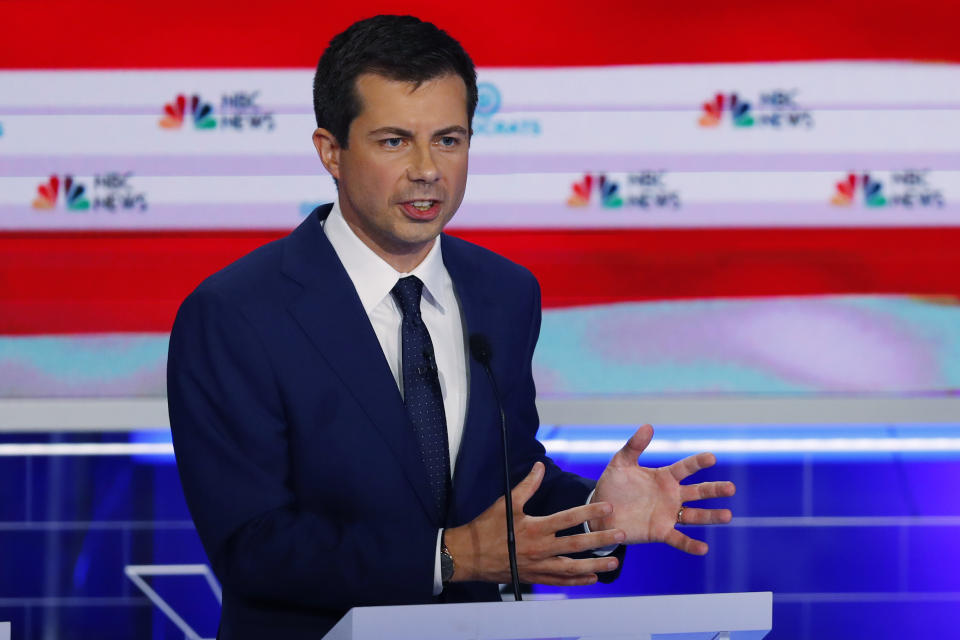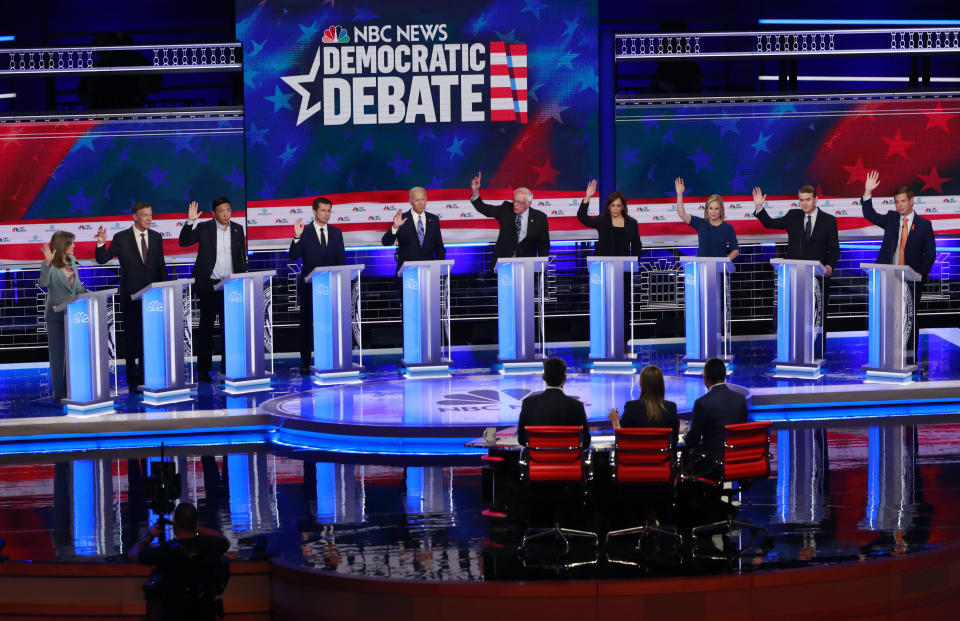Harris's confrontation with Biden a defining moment for first debates
MIAMI — It was supposed to be an introductory affair.
But at the halfway mark of Thursday night’s debate, Sen. Kamala Harris went for Joe Biden’s jugular.
“I do not believe you are a racist,” Harris, a Democratic senator from California, told the former vice president.
But with that faint praise, she then launched into a clearly premeditated criticism of Biden for comments he made recently about working in the Senate with former Mississippi Sen. James Eastland, a notorious segregationist.
Harris called Biden’s remarks “hurtful” and then turned to Biden’s record on the issue of forced busing in the 1970s, when Biden voted against the measure, which was intended to desegregate public schools.
“You also worked with [segregationist lawmakers] to oppose busing,” Harris said, and she added that when she was a young girl, she had been bused to public school as part of a desegregation effort.
Biden reacted defensively.

"I did not praise racists. That is not true,” he said. "Everything I’ve done in my career, I ran because of civil rights. I continue to do that.”
But Harris, a former district attorney in San Francisco, pressed the issue.
"Would you agree today that you were you wrong to oppose busing?” she asked Biden.
Biden tried to defend his decision by making an argument about states’ rights versus intrusions from the federal government. “I did not oppose busing in America. What I opposed is busing ordered by the Department of Education,” Biden said.
States’ rights was also an argument that defenders of segregation used.
Harris seized on Biden’s mistake, noting that the federal government had stepped in “due to the failure of states to integrate public schools.”
"I was part of the second class to integrate Berkeley, Calif., public schools almost two decades after Brown v. Board of Education,” she exclaimed.
Biden grew even more agitated. "Because your city council made that decision,” he said.
Harris made her point one final time, declaratively, noting that sometimes “the federal government must step in” because "there are moments in history where states fail to preserve the civil rights of our people.”
Biden responded by noting his support for the Voting Rights Act, but then saw that his time was up and trailed off in his answer.
“My time’s up,” he said.
It was a stunning exchange, with the 54-year-old Harris showing she is ready to lay claim to the lane that Biden now occupies in the Democratic primary as the alternative to the left-wing darlings Bernie Sanders and Elizabeth Warren. And it overshadowed everything else that took place Wednesday and Thursday nights, as 20 Democratic hopefuls paraded to the stage over two nights to try to generate attention and enthusiasm for their candidacies.

Prior to the debate, the Harris campaign had told Yahoo News it wanted voters to know after the debate that she was the “best candidate to prosecute the case against Trump.” That has been Biden’s argument as well.
Harris’s decision to swing at the primary frontrunner and bet she wouldn’t miss put voters on notice that she could play hardball with Biden, and do it with Trump as well. It was the kind of moment that could shift the momentum and the polling in this race much sooner than most had expected.
“I thought [Biden] performed badly. Not reassuring,” said one experienced Democratic operative who is not working for any campaign.
“[Biden] will not be their nominee, no way,” said a Republican operative with close ties to the White House.
One senior aide to a rival Democratic campaign declared himself “very surprised to see Biden dig into defending his stance against a federal role over busing.”
"That's fundamental to a Democratic Party [that] believes in a government role to address social ills,” the aide said.
Biden aides came to meet the press after the debate and defended their candidate.
“Vice President Biden stood shoulder to shoulder with President Obama in the White House for eight years, so the idea that he is somehow out of step with the Democratic Party when it comes to civil rights, I just don’t think it sticks,” said Symone Sanders, a Biden aide hired to provide outreach to the African-American community.
Kate Bedingfield, another Biden spokeswoman, implied that Harris had engaged in “personal attacks.”
“He’s the frontrunner and we fully expected attacks to come, but he wasn’t going to engage in a back-and-forth of personal attacks,” Bedingfield said.
The Harris-Biden exchange overshadowed the rest of the night, but South Bend, Ind., Mayor Pete Buttigieg also had a good night, showing poise and a sharp command of the issues. His answer to a question about the shooting of a black man by a white police officer in his city earlier this month was also frank and did not evade responsibility.
Buttigieg was asked why the South Bend police force has become less diverse in his time as mayor.
“Because I couldn't get it done. My community is in anguish right now because of an officer-involved shooting, a black man, Eric Logan, killed by a white officer,” he said.
“It’s a mess. And we're hurting. And I could walk you through all of the things that we have done as a community, all of the steps that we took, from bias training to deescalation, but it didn't save the life of Eric Logan. And when I look into his mother’s eyes, I have to face the fact that nothing that I say will bring him back,” Buttigieg said.
Mo Elleithee, who runs the Institute of Politics and Public Service at Georgetown University, said the contrast between Buttigieg’s answer and Biden’s response to Harris was striking.

Buttigieg spokeswoman Lis Smith made the same point.
“He said the buck stops here. The buck stops with me. It was a good contrast with the Washington folks onstage,” she told Yahoo News.
Bernie Sanders, the senator and self-described socialist from Vermont, was strong on his talking points but did not have any breakout moments.
The fireworks of the night were a contrast to the first debate, which was largely the Elizabeth Warren show. The Massachusetts senator entered the Wednesday-night debate head and shoulders above the others in the polls, and nothing happened to change that. But Julián Castro, secretary of housing and urban development under President Barack Obama, elevated himself with a forceful presentation on immigration and, in the process, delivered a body blow to former Rep. Beto O’Rourke of Texas.
The next debate is slated for the end of July, and the threshold of poll numbers and small-dollar donors needed to qualify for that will be higher, slightly winnowing the field.
Former Rep. John Delaney of Maryland told Yahoo News that he won’t be one of the candidates to drop out.
"I think what I have that others don’t is staying power. I think the field will narrow down and we’re gonna stay in,” he said. The former entrepreneur is worth $92 million and said his ability to self-fund his campaign is “part of” his ability to stay in the race.
"I think that’s an advantage,” Delaney said. When asked if he has set a limit on what he’ll spend, he said, “You should assume like any normal person I did, but I don’t disclose it."

A few policy issues bear watching in the months ahead. One is the Democratic debate over how to provide universal health care. Warren eagerly raised her hand when asked Wednesday if she’d do away with private health insurance. The only other Democrat to do so was New York City Mayor Bill de Blasio.
On the second night, Sanders and Harris both raised their hand to support this same measure.
Polling does show significant support for a national health care system that provides universal coverage, but it shows less support once voters are asked about doing away with private health insurance. Warren’s answer on this, which aligns with Sanders’s, might not become a headwind in the primary. But it could hurt the Democrats in the general election.
Among the second-tier candidates, there were a few standouts. Sen. Cory Booker had the most time to talk on the first night, and was the most searched-for candidate online, a sign that he had a good night.
Others, like Sen. Amy Klobuchar and Sen. Michael Bennet, performed capably but are not likely to make or break their campaigns in the debates. Nonetheless, the debates are important for them simply to raise awareness about their candidacies and to allow them to keep trucking on with their appeals to moderate voters.
Two more debates are scheduled, and there will likely be five or six more between now and the time that Iowa voters get to choose their candidate on Feb. 3.
Next up for the candidates are July 4 parades, and then a long, hot summer of county fairs, controversies of the moment and continued debates over how far left the Democratic Party is going to go, and whether that’s the road to perdition in the general election.
Brittany Shepherd contributed reporting
Read more from Yahoo News:



